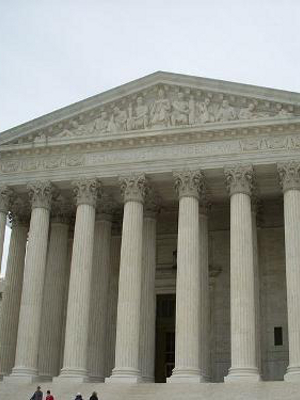Ever since the extraordinary three-day oral argument before the United States Supreme Court on March 26-28 in the healthcare case (U.S. Department of Health and Human Services v. Florida), pundits have been speculating how the Court will rule in June. Respect for the judicial process, while allowing us to debate the merits of cases under deliberation, would have us wait for the actual ruling before praising or attacking a court. For as important as the holding of a court is the rationale used to legitimize the ruling. Yet the Court’s deviation from procedural and substantive law precedent has led to public skepticism about its present role, and made people feel they must speak and act out now rather than wait for further damage to be done.
For most of its 222-year history the Court has been viewed with rose colored glasses as an impartial arbiter of the constitutional rule of law. Now, a growing portion of the public sees the Court as a political institution. The way in which the Court has inserted itself front and center in the national healthcare debate has helped to further that view, as has bitter partisan fighting over judicial appointments. Justice is supposed to be blind, but, as Justice Benjamin Cardozo observed long ago, “We may try to see things as objectively as we please. Nonetheless, we can never see them with any eyes except our own.” In reality, the law is whatever five justices of the nine-member court say it is. So, constraining them from acting on their personal biases, however challenging, is essential to fair play and public trust in the legal system.
Among all the complex constitutional doctrines at issue in the healthcare debate (federalism, the Commerce Clause, the Necessary and Proper Clause, judicial review and restraint, and separation of powers, to name some), one stark reality jumps out: In the United States, compelling individuals to buy car insurance is lawful and legitimate, but compelling them to have health insurance coverage may not be lawful or reasonable. How can that be?
NYU law and philosophy professor Ronald Dworkin, perhaps our most respected living legal scholar, maintains that it should not be – that the 2010 Patient Protection and Affordable Care Act is clearly constitutional. In “Why the Mandate is Constitutional: The Real Argument” (The New York Review of Books, May 10, 2012), Dworkin writes, “The political and social stakes are enormous. But the legal issues, most analysts think, are not really controversial: the Constitution’s text, the Supreme Court’s own precedents, and basic constitutional principle seem obviously to require upholding the act.” After all, the healthcare market has a major impact on the national economy and so falls under Congress’s authority to regulate commerce among the states. Furthermore, the Constitution provides that Congress has the power to do what is necessary and proper to make its laws under other powers effective. Given that American healthcare is in shambles, how can acting to safeguard the health of the citizenry not qualify?
Yet the justices’ questions and demeanor at oral argument has led to speculation that they will strike down key provisions of the Act, if not the entire law. Upon what basis might this occur? What would be the consequences? How have things reached this point? Part II will look at the state of the debate on the Act and seek to answer these questions.
About the author:
The author, a constitutional law scholar, member of the California Bar and TNP contributing writer, lectures on law, ethics and critical thinking in the undergraduate and graduate programs at the University of New York in Prague.
published: 24. 4. 2012







